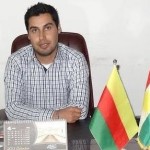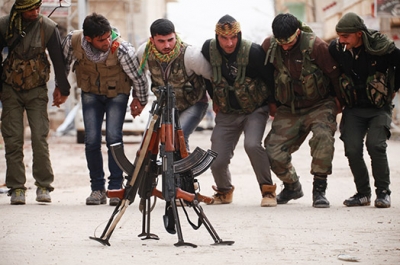“The Kurds are Jews and we will not stop until we exterminate them,” a direct quote from Al-Qaeda’s leader, Abu Khalid Altunisi’s at Friday prayer in Tul Abiat, Southern Syria. Following that speech, Al-Qaeda and 12 brigades of FSA invaded Kurdish villages in the countryside of Aleppo resulting in the massacre and kidnappings of 400 Kurdish civilians, most of them women, children and elderly.
The fight between the Kurds and Al-Qaeda started after a group of ISIS and Al-Nursa Front attacked a Female Protection Unit (YPJ) battalion, now starting its second consecutive year, expanding 900km from the Iraqi-Syrian to the Syrian-Turkish borders, the land which is Rojava or West Kurdistan, a battlefield for Al-Qaeda and Kurdish farmers.
Many Kurds today see Al-Qaeda as taking up the regime’s unfinished task of ridding Syria of any Kurdish identity. In 1963 the regime populated Kurdish land with Arabs to change the demographics of the region with the aim to –unsuccessfully– Arabize the area, this operation later named the Arabic Belt. Now Al-Qaeda is taking it upon themselves to finish the job. Moreover, it is evident that Al-Qaeda is not only acting on behalf of religious ideology, radical Islamism, but also Arab nationalism, both of which are ultimately rejected by the Kurds.
Kurds have liberal views, stemming from their tradition, culture and communication with the west. They understand the role of women beyond child bearers or as sexual objects. Kurdish women are a vital and influential part of the Kurdish society. Freedom of speech and opinion, both highly respected among Kurds in Rojava, is yet another aspect that makes them infidels in Al-Qaeda’s eyes. In the outskirts of Til Hamis, north of Qamishli, Al-Qaeda hijacked a Kurdish wedding, arrested the groom and destroyed everything in sight claiming that weddings were forbidden from that point onwards.
During battles between People’s Protection Unit (YPG) and Al-Qaeda the YPG forces achieved what NATO forces have so far been unable to achieve against Al-Qaeda. Al-Qaeda’s losses resulted in the seizing of large numbers of ammunition and military equipment by YPG which fuelled even further hatred toward the Kurds.
Lately, Al-Qaeda announced that they are no longer fighting the Kurds, a fallacy, as they are currently only fighting YPG. Only last week, Al-Qaeda kidnapped 160 Kurdish civilians, who were on their way to work. The kidnappings were in retaliation to YPG’s victory in Til Brak battle, to date their whereabouts are still unknown. In their media, Al-Qaeda announced that all 160 had been beheaded.
The only goal for the Kurds is to live in peace, like any other nation, having tried very hard to achieve this, asking the regime and the Syrian opposition to let them be. The Syrian regime and opposition have one goal, to replicate Saddam Hussein’s actions upon Kurds, claiming that they would grant Kurds their rights but using nerve gas and the Anfal campaign –the Kurdish Holocaust—instead, just like the opposition, the regime and Al-Qawda did to the Kurds in Rojava. For Kurds, this is no longer a war for freedom, but a war to be, or not to be.
Kurds in Rojava are facing the same problem as their Kurdish brothers and sisters across occupied Kurdish borders; being told that they are Jews, or spies to Israel. Kurds still struggle to convince their countrymen that they are not just Jewish the same way they are convincing Israel that they are not Arab, Turk or Persian.
[wc_testimonial by=”” url=”” position=”left”] Written by Kovan Alshawish, from Rojava. Born in 1988 in Rojava, Kovan spent most of his life between Qamishli and Afrin running away from the regime for being a Kurdish activist. He has covered various political issues, particularly on Syria and Rojava and reporting on current events. Many of his articles are related to the Kurdish status quo and Kurdish rights beyond the international boundaries of Kurdistan analyzing the Kurds within the Middle East context.[/wc_testimonial]
Written by Kovan Alshawish, from Rojava. Born in 1988 in Rojava, Kovan spent most of his life between Qamishli and Afrin running away from the regime for being a Kurdish activist. He has covered various political issues, particularly on Syria and Rojava and reporting on current events. Many of his articles are related to the Kurdish status quo and Kurdish rights beyond the international boundaries of Kurdistan analyzing the Kurds within the Middle East context.[/wc_testimonial]

